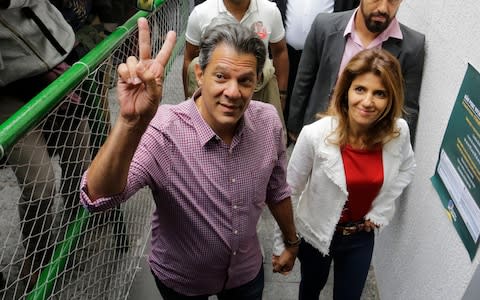Brazil's right-wing candidate Jair Bolsonaro faces run-off in presidential election

Jair Bolsonaro, the populist former army captain who led a wave of support for the far-Right in Brazil's election, said he would not moderate his hardline views as he began his final push to lead the country.
Brazil's political landscape was shaken to the core on Sunday as Mr Bolsonaro took a seemingly unassailable lead in the first round of the presidential ballot while his party Social Liberal Party made huge gains in Congress.
In his first interview since the vote, Mr Bolsonaro said he would stick to his to his uncompromising Right-wing messages and not become a "peace and love" candidate just to win more votes.
His rival, centre-Left candidate Fernando Haddad, pledged to unite moderates across the country to create a broad centrist coalition to challenge the “anti-democratic threat” of Mr Bolsonaro in Latin America's largest democracy.
Mr Bolsonaro secured 46 per cent of the vote, beating Mr Haddad's 29 per cent, but falling just shy of the absolute majority required to win the election in the first round. Meanwhile, Mr Bolsonaro's far-Right Social Liberal Party gained a massive 51 seats in the lower house of Congress, making it the second largest party in the chamber.

The presidential vote will now go to a October 28 run-off between Mr Bolsonaro, who spent much of the campaign in hospital after being stabbed at a rally, and Mr Haddad, the hand-picked candidate of Luiz Inácio “Lula” Da Silva, the Workers’ Party's imprisoned former president.
Mr Bolsonaro said his "discourse will basically stay the same" as he called for the country to "unify" around him, in an interview with the Brazilian radio station Jovem Pan on Monday.
Asked if he would shift to the centre to pick up votes in the second round, Mr Bolsonaro replied: “I can’t just suddenly become ‘Little Peace and Love Jair’ … I’ve got to carry on being the same person.”
Mr Haddid's call to arms for centrists to help him block the far-Right from the presidential palace has echoes of Emmanuel Macron's second-round surge to keep out the National Front's Marine Le Pen.
But a big enough swing to the Left in the second round of voting appears to be a big ask. Opinion polls published before the first round projected a statistical tie between the two candidates in the second, but with Mr Bolsonaro’s strong showing on Sunday, Mr Haddad is likely to have to take votes from his opponent to have any chance of victory.
After a deep recession, sluggish recovery and sweeping corruption scandals, Brazil’s election has been characterised by anti-establishment sentiment as well as a staunch rejection of the Workers’ Party, which has won the last four presidential elections in the country and is mired in bribery scandals.
Mr Bolsonaro rocketed to the top of the polls by representing the fiercest opposition to the Workers’ Party, but he also faces high rejection rates due to his track record of sexist, racist and homophobic remarks.

His proximity to the armed forces is also a concern for many, in a country which lived under a repressive military rule between 1964 and 1985. Mr Bolsonaro has said he intends to fill his cabinet with a new generation of military politicians, many of which were victorious on Sunday.
Mr Haddad only became the official Workers’ Party candidate 23 days before the election, after Lula was officially barred from running due to his corruption conviction.
Broadcasting live on social media after Sunday evening’s results, Mr Bolsonaro gestured towards voters from Brazil’s northeast region, which is traditionally a Workers’ Party stronghold and was the only part of the country in which the Social Liberal Party candidate did not obtain a majority of votes.

In contrast to his usual brash statements, Mr Bolsonaro adopted a more conciliatory tone, declaring that the country “cannot take one more step to the Left, [Brazil’s] path now is to the centre-Right.”
Following false reports of vote rigging, Mr Bolsonaro also took the opportunity to call into question the validity of the results, stating that if Brazil’s voting system “had any integrity”, he would have been elected in the first round.
The front-runner was previously confident of securing an overall majority in Sunday’s vote, declaring that morning that he would be “on the beach” on 28 October, the day of the decisive second-round runoff.

Both candidates will embark on a three-week campaign, which began officially on Monday afternoon. There will be a total of six presidential debates, and Mr Bolsonaro and Mr Haddad will each receive equal airtime for televised political broadcasts.
However, there were suggestions that Mr Bolsonaro would repeat his snub of TV debates in a sign the populist insurgent will continue his reliance on social media as his preferred platform to reach his loyal supporters.

